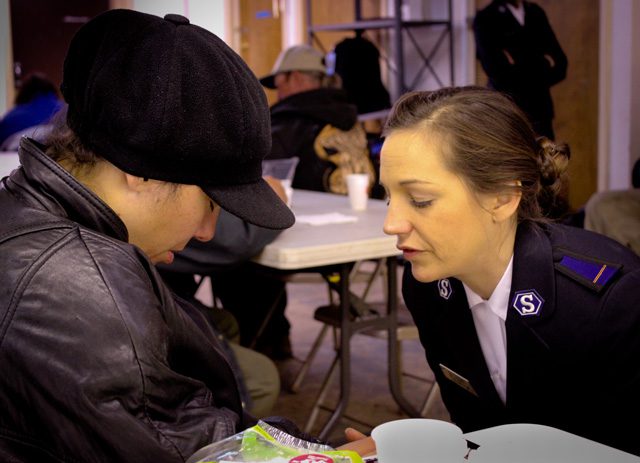 HEALTH EDUCATION DIRECTOR Nixon Jabnil talks with mother and child in front of their home. The young child is nearly ready to be “discharged” from the Army’s nutrition program services. |
photo by Sallyann Hood –
Children’s lives are being saved through the nutrition program of the Rita Corps, reports Major (Dr.) Sallyann Hood, who recently visited the Marshall Islands to participate with the Army’s Asia-Pacific Regional Program Facilitation Team (HIV/AIDS, health development, mission) headed by Dr. Mirriam Cepe.
Capt. Charles Fowler is the Marshall Islands coordinator and Capt. Shari Fowler is director of the Marshall Islands Leadership Training Center. Envoys Ongra and Hemrina Abwe-Hanerc are in-charge at the Rita Corps.
The corps works with a hospital in bringing health to the children. “After being diagnosed with malnutrition at the local hospital, the children and their families are ministered to by Health Education Director Nixon Jabnil and two women who are faithful soldiers and employees, who take their work seriously–for they are saving lives!” said Hood.
After being discharged from the hospital, the small patient is taken home. The child’s name is given to The Sal-vation Army; Nixon gathers the information from the hospital as to how the child is to be treated.
Initially, unprepared food is taken to the home–rice, eggs, and a few can-ned goods, sponsored entirely by the Army. Instruction is given to the family on what the child should be eating, and how the food should be prepared. An Army representative visits weekly. Instruction continues and support is given, even to taking the child to the hospital for the next visit, if necessary.
“If the child does not improve, especially by weight, the second month of the Army’s ministry is given over to preparing the food and taking it to the child’s caregiver,” explains Hood. “The vital instruction continues. More often than not, the faithful workers begin to see a change, as the tiny bodies begin to fill out, the eyes become bright!”
The Salvation Army is presently following six malnutrition cases, all in different stages of recovery. As one tiny patient is “discharged” from the Army’s two-month ministry, another is added. In the meantime, connections have been made: maybe mom and grandma will come to Home League, or to a meeting at the corps.
Circles of influence will be generated in the neighborhood, as the nutritional information is passed on, and the attitude of caring is well demonstrated by those from The Salvation Army.
Our ministry will continue to be to the whole person. We–soldiers,
adherents, recruits, employees, volunteers and advisory organization
members alike–will be a people who see ourselves as catalysts for
meeting the spiritual and social needs of our community.











